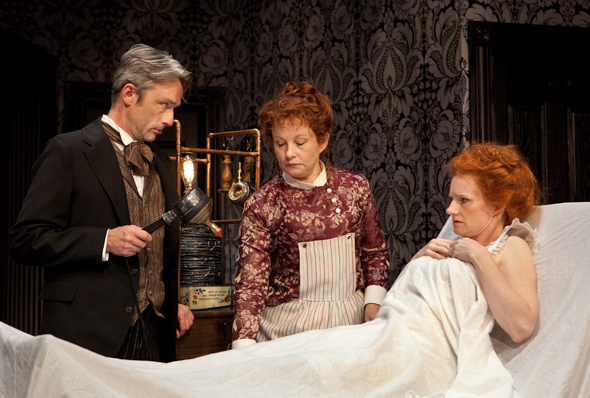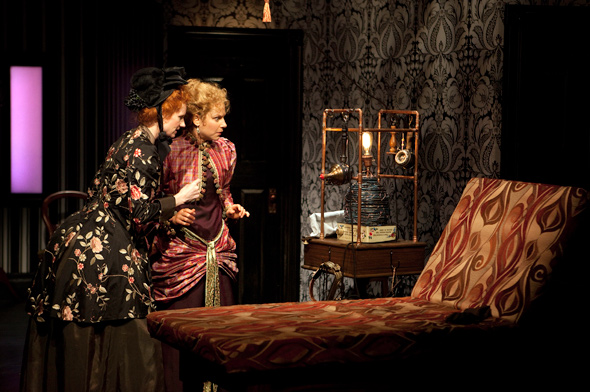
Not much passion In the Next Room
It's fitting that the first public building to use Thomas Edison's electric lamps was the Mahen Theater in Brno â the big ideas presented on a stage were the first to glimmer with electric light. Sarah Ruhl's play In the Next Room, directed by Richard Rose at Tarragon Theatre, examines an offshoot of Edison's invention, the vibrator, which harnessed the hum of electricity brought straight into the home. While the inventor at the centre of the play, Dr. Givings, continually gives Edison credit, it's the good doctor's invention that pleases the local patients.
The vibrator, which plugs straight into overhanging lights, is used by Givings to treat patients diagnosed with hysteria. We meet two such subjects throughout the course of the play, one man and one woman, who become "cured" after a few go-arounds with the electric wonder. In the next room, the Doctor's dutiful wife Catherine, who is positively charged with energy, is looking for a human connection to replace the one that has fizzled with her scientific husband.
You'd expect a play about the history of the vibrator would be abuzz with compelling questions about sex and love, science and passion, or sexual liberation, but Ruhl's play never reaches maximum speed. It's a quaint comedy with flashes of deeper implications, but ultimately what's going on in the next room doesn't make you want to pick the lock. Rose's production features strong performances, but the tone doesn't really land where it should.

Ruhl is one of America's most exciting young playwrights. Her plays Dead Man's Cell Phone, Eurydice, and Passion Play have all been warmly received, with In the Next Room a finalist for both the 2010 Pulitzer Prize and the Tony Award for Best Play. The hysteria suffered by the patients on the doctor's table seems caused by a lack of passion. Givings and the lady of the house also lack spark, the irony being that he can please everyone but his own wife.
It's this central relationship where the play, and Rose's production, goes awry. David Storch plays the role with clinical precision. The earnestness with which the doctor believes his instrument is treating hysteria, as opposed to giving immense pleasure, is unwavering. The result, however, makes Givings a poor theatrical subject â in the debates about passion and love that the play should be about, Givings is flaccid. The closest he comes to bubbling over with emotion is in indicating that he might be feeling something close to jealousy after seeing his wife touch the face of another man. Storch plays the part with nuanced restraint, but isn't given a chance to go far beyond.

Trish Lindstrom's Catherine ends up coming off more hysterical than any of the other characters diagnosed as such. Lindstrom injects passion invaluable to the play, but the energy is misspent in the scenes with the dour Givings, as the debate never finds balance. The scene in which she first explores the vibrator with Mrs. Daldry, Melody A. Johnson, is her finest. Marci T. House as Elizabeth, the stand-in wet nurse for Catherine, and Elizabeth Saunders, Givings' assistant, each turn in solid performances.
All the energy spent debating the merits of the vibrator, and just who may benefit from its sensations, don't seem to reach the cozy conclusion the doctor and his wife find away from any form of electricity. While the second act somewhat makes up for the farcical tone of the first, the ending is far too neat for a play about love, sex, passion, and electric assistance.
David Boechler creates a rich interior, which allows for the eavesdropping and door listening inherent in Ruhl's script. It's rare for a prop to steal the attention, but the ancient vibrator (a far cry from the offerings on today's shelves) is a beautifully crafted piece of stage machinery.
In the Next Room reaches towards a comment about the complexities of enduring sexual energy between men and women, but fails to reach climax with an unbalanced debate between science and passion.
---
In the Next Room or the vibrator play, by Sarah Ruhl, is playing at the Tarragon Theatre from September 13 - October 23. Tickets are $22 - $38.
Latest Videos
Latest Videos
Join the conversation Load comments







